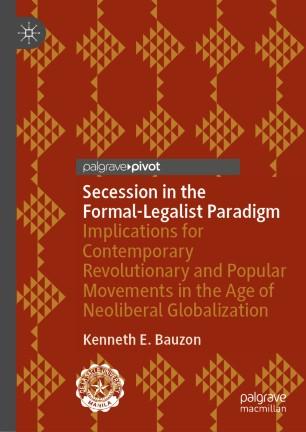in the Formal-Legalist Paradigm: Implications for
Contemporary Revolutionary and Popular Movements in the Age of Neoliberal Globalization 1st ed. Edition
Kenneth E. BauzonVisit to download the full and correct content document: https://ebookmass.com/product/secession-in-the-formal-legalist-paradigm-implication s-for-contemporary-revolutionary-and-popular-movements-in-the-age-of-neoliberal-gl obalization-1st-ed-edition-kenneth-e-bauzon/


Secession in the Formal-Legalist Paradigm Implications for Contemporary Revolutionary and Popular Movements in the Age of Neoliberal Globalization

SecessionintheFormal-LegalistParadigm
KennethE.Bauzon Secession
intheFormal-Legalist Paradigm
ImplicationsforContemporaryRevolutionary andPopularMovementsintheAgeofNeoliberal Globalization

KennethE.Bauzon
SaintJoseph’sCollege—NewYork
Brooklyn,NY,USA
ISBN978-981-15-7500-6ISBN978-981-15-7501-3(eBook) https://doi.org/10.1007/978-981-15-7501-3
TheprinteditionisnotforsaleinthePhilippines.CustomersfromthePhilippinesplease ordertheprintbookfrom:DeLaSalleUniversityPublishingHouse. ISBNofthePhilippinesedition:978-971-555-683-5
©TheEditor(s)(ifapplicable)andTheAuthor(s),underexclusivelicensetoSpringer NatureSingaporePteLtd.2021
Thisworkissubjecttocopyright.Allrightsaresolelyandexclusivelylicensedbythe Publisher,whetherthewholeorpartofthematerialisconcerned,specificallytherights oftranslation,reprinting,reuseofillustrations,recitation,broadcasting,reproductionon microfilmsorinanyotherphysicalway,andtransmissionorinformationstorageand retrieval,electronicadaptation,computersoftware,orbysimilarordissimilarmethodology nowknownorhereafterdeveloped.
Theuseofgeneraldescriptivenames,registerednames,trademarks,servicemarks,etc. inthispublicationdoesnotimply,evenintheabsenceofaspecificstatement,thatsuch namesareexemptfromtherelevantprotectivelawsandregulationsandthereforefreefor generaluse.
Thepublishers,theauthors,andtheeditorsaresafetoassumethattheadviceandinformationinthisbookarebelievedtobetrueandaccurateatthedateofpublication.
Neitherthepublishersnortheauthorsortheeditorsgiveawarranty,expressorimplied, withrespecttothematerialcontainedhereinorforanyerrorsoromissionsthatmayhave beenmade.Thepublishersremainneutralwithregardtojurisdictionalclaimsinpublished mapsandinstitutionalaffiliations.
ThisPalgraveMacmillanimprintispublishedbytheregisteredcompanySpringerNature SingaporePteLtd.
Theregisteredcompanyaddressis:152BeachRoad,#21-01/04GatewayEast,Singapore 189721,Singapore
Inlovingandfondmemoryof
ManangEvelyn and KuyaMarvin
Preface
Thisworkhasgonethroughdecades-longperiodofgestation.Thecore ideasdevelopedhereinhaveevolvedthroughvariousstagescontained initiallyinapaperforacomparativecivilizationsconference.Butthis paperitselffollowsatleasthalfadecadeofresearchandruminations whileingraduateschoolonIslamicnationalismandseparatisminthe Philippinesandelsewhereleadingtoadoctoraldissertation,severalother conferencepapers,andanarticleontheBengalisecessionfromPakistan in1971,in AsiaQuarterly publishedbyaBrussels-basedinstitute.
Thecoresubjectofsecessionism,alongwiththecognatetermsof separatismandirredentism,becamefashionableastheColdWarwas nearingitsendduringthelate1980sandthemainstreammediaaswellas academicjournalsintheUnitedStates(US)andtheWestbeganfocusing theirattentiontowhattheytermed“ethnicconflicts”aroundtheworld. Theconcern,inpart,wastheperceivedfragilityofthestatesystem, muchofwhichwasbornoutofcolonialismthroughoutmuchofAsia, Africa,andLatinAmerica,whoseboundarieswereartificiallydrawnby thedepartingcolonialpowerseitheroutofhaste,expediency,orcompromisewithanothercolonialpowerincontrolofaneighboringterritory. Theborderlinesdrawn,itwasfeared,eitherexcludedorhighlyfavored certainethnicgroupsandthis,itwasargued,wasarecipeforethnicbasedpoliticalconflictandinstabilitypotentiallyunderminingthesecurity ofthenewstate.Toself-describedanalystsandobserversatthattime,the factthat,withtheimpendingendoftheColdWarandthecommunist
boogeymanwassoontodisappear,theideathatanewenemy—ethnicorreligious-basednationalism—hadtobefoundtojustifypost-ColdWar militarybudgetdidnotseemtoattractmuchcriticalinquiryatthattime.
Therealizationthata“newenemy”hadtobefoundinthewakeof theendoftheColdWaralludestoconstructivismwhichsuggeststhat the“enemy”isamentalconstructconceivedatamomentintimeconvenientandexpedienttotheconstructorinpossessionoforincloseassociationwithpower.Italsohelpsexplainanearly raisond’etre forthis work.Earlyon,asanovicescholar,Iwasdirectedtomattersinvolving discrepanciesbetweenformalrulesandactualbehavior,betweenprofessionsofobjectivityandmanifestationsofpoliticalandideologicalbeliefs, andbetweenclaimsofthestateandinterestsofsociety.Myexposureasa graduatestudenttoThomasS.Kuhn’sparadigmaticapproachseemedto providemewithatool,enduringtothisday,withwhichtoorganizethe information,categorizeevents,identifyactors,andmakesenseofevents bothhistoricalandcontemporary.Indeed,partofmyreasonforinvoking thisapproachhereistoinspiregraduatestudentsandbuddingscholarsto beinventive,resourcefulbutalwayscriticalintheirresearchandwriting endeavors.
Today,whilemanystatescontinuetoberiledbyethnicanimosities threateningthesestates’cohesionandlong-termviability,wearewitness toatrenddifferentfromifnotoppositetowhatwehavebeenwarned againstduringthefinaldecadeorsooftheColdWar:theriseofethnicor racialextremisminwhichcertaingroups,incloseassociationwithpower, asserttheirsupremacyoverotherswhichtheyhavesoughttolegitimize byorcodifyintolaw.TheseareexemplifiedbytheZionistStateofIsrael’s recentpassage(inJuly2018)ofthenation-statelawwhichdefinescitizenshipintermsofone’sJewishness,automaticallyredefiningIsraelisof Arabor,forthatmatter,othernationalities,assecond-classcitizens,while helpingaccomplishoneofthegoalsofZionismwhichistheretakingof thewholeofPalestine,regardlessofconsequencestoPalestinians,noton thebasisofinternationallawbut,rather,onBiblicalgrounds.Another exampleistheCitizenshipAmendmentBillpassedbytheIndianParliamentinDecember2019.UndertheguiseofprotectingIndianswhohave fledintoothercountriesongroundsofreligiouspersecution,thenewlaw welcomestheserefugeesbackintoIndia,butnotiftheyareMuslims.
GiventhatIndiaisoverwhelminglyHindu,thenewlawalsoemboldens Hindunationalists(knownasadherentsoftheideologycalled Hindutva, promotingHindusupremacy)toasserttheHinduwayoflifeatthe
expenseofMuslimsandotherminorityreligiousgroup,whoareturned intosecond-classcitizens.Aconsequenceofthisisthevirtualtakeover ofKashmirbytheModi-ledgovernmentofIndia,ignoringitsprotected statusunderinternationallawpendinginternationalsettlement.Inother partsoftheworld,whilenotasextremeasthetwoaforementionedexamples,weseenonethelesstheriseininfluenceofextremenationalistor racialistorientationexemplifiedbytheascendancyoftheTrumppresidencyintheUSwiththesupportofwhitesupremacistgroups;nativist orwhitenationalistsupportforBrexitinGreatBritainfromtheEuropeanUnion;US-encouraged,neo-Nazi-stokedrussophobiaintheformer SovietEasternEurope,e.g.,theBalticstates,Poland,Hungary,Bulgaria aswellastheformerSovietstatesofUkraine,andGeorgia.InSouth America,wehaveseentheresurgenceofright-wingauthoritarianism exemplifiedbytheJairBolsonarogovernmentinBrazil,andthepostcoupmilitary-backedgovernmentinBoliviathatoverthrewthepopular governmentofEvoMorales,andthepopulistauthoritarianpresidencyof RodrigoDuterteofthePhilippines.
ManysubsequentcommentatorshavevariouslydescribedKuhn’s paradigmaticcontribution,adoptedinthiswork,asbeingpostbehavioralistorpostmodernist,orboth.Itakethepositionthateitheroneisapt because,eitherway,itprovidedasensibleexplanationastowhyscience, muchlesssocialscience,isnotwhatmanyofitspractitionersusedto boastitis,i.e.,dispassionate,value-free,andobjectiveandthat,infact,it isvalue-ladenfromthemomentitconceivesofaproblemtothemoment theknowledgeisproduced.Postbehavioralism,ofwhichKuhnwasamong itsarticulateandintelligentspokespersons,broughthumilitytothepractitionersoftheprecedingperiodpervadedbybehavioralisminthatvalues areaninherent,unavoidablecomponentoftheknowledgeproduction endeavor.Postmodernism,ontheotherhand,was—andis—thereshaping ofattitudes,againgivinghumilitytotheotherwiseconceitedideathat humancivilizationhadreacheditszenithwithmodernity,forgettingthat itcamewithcostsintheformof,amongothers,industrializationthat degradedtheenvironment;urbanizationthatleftcitiesunabletocope withservices;accumulationofwealthatthedisposalofafewhouseholds leavingavastnumberwithlittle;privatizationandcommodificationofthe globalcommonsunderaregimethatturnedthestateintoanaccessory; rampantcorruptionandcriminalityinhighplaces;and,moraldepravityof thewealthyandthepowerful,livingingatedcommunities,whohavelost themeaningofempathyand,alongwithit,theircapacitytobehuman.
TheKuhnianparadigmaticapproachalsoallowedmetoplaceinproper perspectivethenature,history,andconsequencesofformal-legalism,a centralconceptinthisessaythatismorethanatermintheindex.With itsoriginsintheEnlightenmentasatoolwithwhichtoordersociety andsubduenature,italsoprovidessecularprinciplesthathaveinevitably cometopervademodernsocial,political,cultural,andeconomiclife.It ordershumaninteractioninallthesefacetswiththepromiseofreward forconformityandsanctionsfordisobedience,andprovidesforformal institutionsforenforcement.Thisiswherethephenomenonof“secession”becomessalientbecausepractitionersoftheformal-legalparadigm havegrappledwithitinvariousways,notasanobjectofexceptional obsessionbutasamatterofcourse.Onlyincertaincircumstancesdid thesubjectreceivemorethananordinarydegreeofattention.Yetto understandhowvariouspractitionershavedealtwiththisphenomenon,it wasnotjustamatterofsearchingfortheirrespectivedefinition perse of theterm.Itwasamatterofreconstructingtheirworldviewinrelationto thoseoftheirfellowpractitioners(orcolleagues)eithercontemporarilyor thosethatprecededthemorcurrently.Thus,ifreadersarelookingfora straight-outdefinitionoftheterm,andhavenopatiencetoplodthrough myexplanationoftheparadigm’sownexplanation,i.e.,myreconstructionofthemannerinwhichitspractitionershavetriedtomakesenseof theirworld,theyarewarnedthatthisworkmaynotbeforthem.The invitationis,nonetheless,opentothemtotaketimeandunderstandthe conceptunderlyingtheapproachtakeninthisworkwiththecaveatthat, inallhumility,itsimplementationisfarfromperfect.
AfurtherwayinwhichtheKuhnianparadigmaticapproachhasproved fortuitoushasbeeninhelpingmemakesenseofmypersonalencounters withsomeoftheleadingpersonalitiesincontemporaryPhilippinepoliticallife.Duringdifferentstagesofmyprofessionalcareer,andinrelation tomypursuitofmyresearchagenda,Ihavehadthegoodfortuneof meetingandinterviewingKaLuisTaruc,co-founderandreputed Supremo (SupremeLeader)ofthe HukbongBayanLabansaHapon (People’s Anti-JapaneseArmy,withtheacronym Hukbalahap or,simply, Huk ),a largelypeasantguerrillaoutfitthatresistedtheJapaneseduringtheirinvasionandbriefoccupationofthePhilippines;DatuNurulhadjiMisuari,cofounderandChairmanoftheMoroNationalLiberationFront(MNLF), theleadingMuslimorganizationthatsought,invariably,anindependent statehoodandautonomyforMuslimMindanaoandSuluandfought nearlyadecade-longwarintheSouthernPhilippinesduringtheperiod
oftheMarcosdictatorship;and,ProfessorJoseMariaSison,founderof there-establishedCommunistPartyofthePhilippineswhichcontinues, tothisday,towagewhathasbeenreferredtointhepopularmediaasthe longestMarxist-orientedinsurgencyinAsia.
Comingawayfrommyconversationwitheachofthem,Ihaveformed theimpressionthatthelivestheyledand,inthecaseofMisuariandSison, continuetolead,weremotivatedbyethicalandmoralconsiderationsborn outofwhattheyrecognizedastheinjusticesinsociety,theunfairnesswith whichtheirfellowhumanbeingswerebeingtreated,andtheinability ofgovernmenttoaddresstheirgenuinegrievancesandthoseoftheir followers.Thatrevolutionaryforcehasbeenacomponentoftheirstruggle iseasilyjustifiedbythecounterrevolutionaryandreactionaryuseofforce bythestate,morelethalandsustainedthanthecombinedforceofthe revolutionaryforcesrepresentedbyTaruc,Misuari,andSisonduringany momentinhistory.Todismissthesepersonalitiesasviolentorterrorists, achargecomingusuallyfromwell-meaningedbutill-informedliberals, wouldbetoignoreifnotexcusetheviolenceofthePhilippineState andtheUSempirethatcreatedittobeginwith.Inthiscontext,Frantz Fanon’sinsightsonrevolutionaryforcecontainedinhis TheWretchedof theEarth remainrelevantasessentialsourceofadviceandinspirationto action.
Giventheanalyticframeworkdiscussedinthiswork,thewaythestate haslabeledthematvariousstagesasterrorists,outlaws,bandits,andthen asmainstreampoliticians,diplomats,ornegotiatingpartnersatteststo thevariabilityofmeaningthatcouldbetunedinoroutdependingon prevailingconditions.Thenatureofthestateitselfismutablecontraryto itsclaimasrepresentationofabsolutetruthandvirtue.Afterall,itrepresentstheinterestsofthedominantclassthatcontrolsit,anditsmotives arethosebytheseinterests.And,inthehierarchyofinternationalrelations,thePhilippineState,asaclientstateoftheUSempirethatinitially createditasatoolofcolonialcontrol,itfulfillsanimportantsupport functionforthemaintenanceofUShegemonyunderconditionsofthe prevailingneoliberalglobalization.
ThemovementledbyTaruc,althoughitemergedoutofnationalisminresponsetotheJapaneseinvasionandoccupationofthePhilippinescommencingin1941,evolvedintoapeasantinsurgencyagainstthe semi-feudalconditionsoflandtenancymaintainedbylandlord-politicians restoredtopowerbyGeneralDouglasMacArthurafterthewar,actingin hiscapacityasthecommandinggeneraloftheUSArmedForcesintheFar
East(USAFFE)andasthepowerbehindthefledglingpost-wargovernmentinitsearlystages.ThearrestandincarcerationofTaruc,following abetrayalinMay1954,puttheHukMovementatthehandsofaleadershipledbytheLavabrothersripewithcorruption,rivalryfueledby personalitydifferences,andmisguidedrevolutionarytacticsandstrategies. ItwasundertheseconditionsthatSison’srevitalizationoftheCommunistPartyofthePhilippines,complementedbyasmallbutcommitted armedforcechristenedtheNewPeople’sArmy,inlate1968,wasfortuitous.ThatSison’smovementhasnowlastedoverhalfacenturynotonly makesitthelongestinsurgencyinAsia,asmentionedearlier,italsoattests tothetenacityofitsfighterswhosenumberhasgrowntoseveralthousandsscatteredthroughoutthearchipelago;and,thepersistentfailure ofthestate,successortothecolonialstatesetupbytheUSempire followingitsconquestandoccupationofthecountryattheturnofthelast century,tobringaboutajustandanequitablesociety.Withtheintercessionofpacific-orientedNordiccountries,particularlyNorway,thePhilippinegovernmenthasenteredintoanintermittentseriesofpeacenegotiationswiththeNationalDemocraticFrontofthePhilippines(NDFP),asa negotiatingarm,inwhichbothsidesagreed,in1998,tothetermsofwhat isknownastheComprehensiveAgreementfortheRespectofHuman RightsandInternationalHumanitarianLaw(CARHRIHL),providing mechanismforthemonitoringandreportingofviolationsbyeitherparty. Finally,Misuari’smovementarticulatedthelong-standinggrievanceofthe Muslimcommunity,betrayedandusedduringtheUScolonialadministration,andignored,discriminatedagainst,andtreatedassecond-class citizensduringthepost-independenceera.Findingcommoncausewith theNationalDemocraticFront(NDF),anallianceofprogressivenationalistandanti-dictatorshipforcesofwhichSison’smovementwasavital part,Misuari’smovementcommencedaseparatistwarin1972soonafter thenPresident-turned-dictatorFerdinandE.Marcosdeclaredmartiallaw justastheendofhissecondfour-yearterminofficewasnearingitsend. Misuari’sseparatistforcestieddownthePhilippinemilitaryduringthe war’smostactivephasebetween1972and1976.In1976,theTripoli Agreementwasannounced;thiswasapeaceagreementthatattemptedto providearoadmaptowardautonomyforMuslimsinthesouthernPhilippines,negotiatedwiththeintercessionoftheOrganizationofIslamic ConferencewiththeGovernmentofLibyaunderPresidentMuammar Gaddafihostingthemeetingsandlendingitsgoodoffices.
Thesignificanceoftheabove-encounterswithTaruc,Sison,and Misuariandoftherespectivemovementstheyledmaybegleanedthrough someimportantlessonslearnedthathavehadadirectbearingonthe conceptionanddirectionofthepresentwork.Theselessonsmanifestand barethemselvesoutthroughoutthework.First,therealizationthatthe “enemy”isapoliticalconstructionwhosemeaningchangesjustasinterestsandconditionschangealso.Thus,itdoesnotmatterwhatthelaw saysinthatthelawitselfischangeablesubjecttoenforcement,nonenforcement,modification,oroutrightcontravention.Similarly,theact ofthesupposedenemymay,atvarioustimes,becondoned,endorsed,or criminalized.Second,formal-legalismasanapproachtosocialandpoliticalorganizationisfarfrombeingdispassionateorscientific;itsprinciples arerootedinsocietywhichare,inturn,impactedbysociety.ItsemergencewascoincidentaltotheemergenceofthebourgeoisieinEurope needingformal-legaltoolstolegitimizetheirascendancy.Today,thattool isessentiallyatthedisposaloftheUSempireasinheritorbydefaultof European—particularlyAnglo-Saxon—civilizationasitinternationalizes itsdomesticlawandchooses,atwill,toobeyorignoreinternationallaw. TheUSimperialstate,astheforemostcontemporaryexampleofaformallegalstate,althoughitisdependentonsocietyforsustenancethrough taxesandacompliantpopulation,behavesasthoughitexistsautonomous fromsociety;itsinterestsaredifferentfromthoseofsocietyitself.And, third,followingthelogicofthetwoaforementionedlessons,thevarianceifnotcontradictionbetweentheprinciplesofformal-legalism,onthe onehand,andtheactualbehaviorofstates,ontheother,oftenbasedon realismwhichgivesprimacytoconsiderationsofpowerandinterests.In viewofthis,formal-legalismbecomesinstrumentaltopowerintermsof itscontent,procedures,andintentionsorpurposes.Laws,rules,andthe institutionsthatenforcethembecomemeaningfultotheextentthatthey servetheinterestsofpower.Hence,theyhavenouniversalapplicability, onlyaparticularone,particulartothatstate,unlessthatstateattemptsto internationalizeitsdomesticlawsaswhattheUSisattemptingtodoright now.
Theimplicationsoftheabove-lessonsmaybemoresignificantthan onerealizes.Collectively,theyhelpmakesenseofwhyastatemaylabel agroupinonecontextasterroristand,inanothercontext,asanally.In termsofthecentralthemeofthiswork,theyhelpmakesenseofwhysome instancesofsecessionareendorsedandothers,not,evenhavingnothing todowiththelaw.Theyhelpmakesenseofwhysomepoliticaland/or
revolutionarymovements,includingwhatwouldevidentlyberegardedas terroristgroups,areopposedwhileothersareencouraged,funded,and evenarmed.Theyhelpmakesensetooofhowanentrenchedclassmay couchitsrhetoricintermsofthecommongoodwhenitservesonlyits ownnarrowinterests,andhowthisclasshasaccesstoandcontrolofthe instrumentalitiesofstatepower.And,theyalsomakecomprehensiblehow thestate,oranyofitsagencies,mayengageinbehaviorthatwouldotherwisebeconsideredascriminal,inappropriate,orunconstitutional,e.g., assassinations,blackmail,collusionwiththeunderworld,regimechange, amongmanyothers,invokingstateimmunityor,asthecasemaybe, theclaimtothemonopolyoftheuseofforce,ortruth,givingitthe excusetopersecutetruthtellers,alltelltalesignsoftheunravelingofa state,constitutionally,thatis.
Parallelobservationsbyanyoneofthetraitsidentifiedhereinofthe politicalprocess—eitherdomesticorinternational—thataremademore comprehensiblebytheanalyticframeworkofferedhereinshallbeconsideredameasureofsuccess.WouldIhavebeenabletocomposework suchasthiswithoutmypersonalencounterwiththeabove-mentioned personalities?Theanswerwouldbeintheaffirmative.However,itwould decidedlybelessmeaningfulwithoutthispersonalexperiencethathas broughtmethatclosetosomeoftheleadingpersonalitiesthathave trulyhelpedshapecontemporaryPhilippinehistory,addingrichnessto itsinterpretation.
Acknowledgments
Whilethecompositionofthismanuscriptisasolitaryundertaking,the initialinspirationwasderivedlongagofrommyprofessors,classmates, andfriendsingraduateschoolatDukeUniversitywhoprovidedadeep wellofsupportandintellectualstimulationthatcontinuetoinspiretothis day.Inparticular,thelateProfessorsHaroldT.ParkerandRalphBraibanti haveengagedmeinnumerousconversationsaboutthehistoryofideas andcomparativeethnicandreligiousnationalism,respectively,thattheir respectivethoughtshavefoundtheirwayinterwoveninthepagesthat follow.Tothemgoesmyeternalgratitude.
MysincereappreciationgoestoDr.NassefManabilangAdiong,AssociateProfessorattheInstituteofIslamicStudies,UniversityofthePhilippinesinQuezonCity,Philippines,andfounderofInternationalRelations andIslamicStudiesResearchCohortattheUniversityofthePhilippines, andChiefEditorofthe InternationalJournalofIslaminAsia, among others.Itwasthroughhiskindintroductionthatthismanuscriptcame totheattentionoftheCommissioningEditorofPalgraveMacmillan andtheDirectoroftheLaSalleUniversityPublishingHouseinManila, Philippines,respectively,forconsideration,review,andacceptancetoward ajointpublication.
Fortheirlifelongsupportandencouragement,Iamgratefulmorethan wordscouldexpresstoDrs,LeslieE.BauzonandAuroraF.Bauzon, themselvesacknowledgedleadersintheirownfieldsfortheirpioneering xv
workinPhilippineprehistoricchronologyandculture,andasawardwinningpediatricianandaccreditorinbehalfofthePhilippineAccreditingAssociationofSchools,Colleges,andUniversities,respectively.Their successhasservednotonlyasasourceofpridebut,moreimportantly, trulyasinspirationinmyownprofessionalendeavors.
QuietlyworkingbehindthescenesprovidingsupportandcompanionshiponadailybasishasbeenRosaida,whoalsoremindsmewhenItend toforgetthatgoodhealthandwell-beingareprerequisitestoperforming wellprofessionally,includingwritingabook.Thus,tohergoesmyaffectionate“Thankyou”withthehopethatsomedayshedoesnotgettired doingthesethingsthatIhavebeenveryappreciativeabout.
Finally,onemayask“Whatwouldabooklooklikewithoutan index,afineindexatthat?”IhavebeenfortunatetohaveenlistedMs. MeridithMurraytoprovidethefine,professionalindexcontainedherein. Ms.Murrayhasmysinceregratitudeforherprompt,courteous,and professionalserviceperformedwithanappreciationofthesubjectmatter.
Itgoeswithoutsayingthatnoneoftheabove-mentionedindividualsareresponsibleforthefaults,errors,omissions,interpretations,and conclusionscontainedherein.

Introduction
Abstract Thischapterexplainstheelements,assumptions,process behindtheparadigmaticapproach.Itillustrateshowthepresuppositions ofpractitionerssharingaworldviewthatconstitutesaparadigmcondition howtheydefineaproblemtobeinvestigated,howtheygoaboutsolving it,andhowtheychoosetheirtoolsandmethodswithwhichtosolveit. Itexplainswhythesepresuppositionsinevitablyideologizetheprocessof inquiry,andhowtheknowledgeproducedhaspoliticalconsequences.It takestheexampleofthebehavioralmovementinthesocialsciencesand howthisbecameadominantmodewhileitlasted,andhowitinfluenced theformal-legalistapproachinconstitutingastateinrelationtosociety anditsconstituentparts.
Keywords Paradigm · Insurgentparadigm · Enlightenment · Behavioralism · Post-behavioralism
1.1 TheParadigmaticApproach
Whatfollowsisinlargepartanexplanationonexplanation.Morespecifically,itseekstoexplainhowadominantperspectiveorparadigmof explanationhassoughttodefineanddescribethephenomenonofsecessionism.Secessionismishereunderstoodasthetendencyonthepart ofmembersofacertaingroupwithinalargersocietysharingcommon
©TheAuthor(s)2021
K.E.Bauzon, SecessionintheFormal-LegalistParadigm, https://doi.org/10.1007/978-981-15-7501-3_1
history,religion,culture,aspirations,ornationality—basedonanyorall oftheaboveincludingsharedethnicityorraceandlanguage—tocome togetherandmaintainanidentityseparatefromthatofotherswithinthe sameconstitutional-legalframework.
Thistendencyisexpressedpoliticallywhenthisgroupremoves—or attemptstoremove—itselffromtheexerciseofsovereigntybyacentral authorityand,correspondingly,whenitsucceedsinestablishingaseparateauthoritythatassertsaclaimtosovereigntyoveritsmembers.At thefirstinstance,thesecedinggroupfreesitselffromanyobligation toobeyor,otherwise,conformwiththelawsandrestrictionsofthe authority—representedbytheconstitutionalorder,includingthecoercivemechanisms—ofthestatefromwhichthegroupisseceding.This secessionpresumesdissonanceintheworldview—orparadigmasthe casemaybe—ofthoseinstateauthorityrepresentingtheestablished constitutionallegalorder.InKuhnianterms,secessionhererepresents ananomalytothe“normality”thattheformal-legalorderrepresents butwhichitisfailingtoaccountforinitsexplanation.Inthesecond instance,thesecedinggroup,representinganinsurgencytothedominant constitutionalorderandasapoliticalmovement,attemptstoassertits owndistinctidentitynolongersubmergedwithinorsubordinatetothe previousorder,andthusforgesitsowndestinyandestablishesitsown orderbasedoncategoriesthatrecognizethenewnormality.(Kuhn).
Asameansofunderstandingthepoliticalprocess,Isubmitthatthe paradigmaticapproachofferspromise,andthisessayisamodestalbeit novelattemptatapplication.ThomasS.Kuhn,admittedly,wasconcerned mainlywiththegrowthofscientific—ratherthanpolitical—knowledge, e.g.,thenatureoftheCopernicanRevolutionasachallengetothethendominantreligion-friendlyPtolemaicviewoftheuniversethatputthe earthatitscenter,justifyingthepowerandtheclaimsoftheChristianChurchbutnotformuchlonger.Oncetheseclaimsweredebunked consequenttothis(Copernican)Revolution,accordingtoKuhn,awhole neworientationsetinwhichnotonlycontributedtothedeclineof universalecclesiasticalauthoritybutalsoprovidedtheconditionsforthe emergenceofthesecularstate.
ThisessaydoesnotpretendtoexplainthegrowthscientificknowledgeasKuhnhasdoneinapioneeringway;rather,itsuggeststhat paralleleventshappeninthegrowthofpoliticalknowledgewhichcould notbeassumedtobeunaffectedby,orunrelatedto,controversies thatcharacterizethegrowthofscientificknowledge.Inexplainingthe
growthofpoliticalknowledge,itissuggestedherethataparallelifnot complementarysetofprocessesandoutcomesmaybefound.Employing Kuhn’soriginalformulationaboutthegrowthofadominantscientific paradigm,theroleofpractitionerssharingbasicassumptionsabouthow aproblemisdefined,thetoolsandmethodsused,andthesolution eventuallypropounded,andtheriseofwhatKuhndescribedasaninsurgentparadigmattestingtothedominantparadigm’sfailuretoexplainan anomalouscondition,leadingtoanaccommodationoftheinsurgencyif notaltogetherobsolescenceordemiseoftheparadigmpavingtheway foracompetingparadigmtoholdswayovertheproductionofknowledgewithitsapparentlymorecoherentworldviewandexplanatorytools, allofthesehavebeen—andare—commonplaceintheprocessesentailed inobservingthebirthanddemiseofparadigmsthatpurporttoexplain thegrowthofpoliticalknowledge.Inrelatingtheseprocesses,Kuhn’s conclusionisthattherelationshipbetween,within,andamongparadigms andsub-paradigms,asmeansbywhichthegrowthofknowledgemaybe apprehended,isarevolutionary—ratherthanacumulative—one.
Asaconsciousanddeliberatemeansofunderstandingthecontemporaryworldastheonebeingattemptedinthisessay,theKuhnian paradigmaticapproachisanticipatedtofunctionasapotentexplanatorytool.Notwithstandingcriticismsthathavebeenleveledagainstit,it iscontendedherethatthefundamentalunderpinningsoftheapproach haveremainedsoundandsteadfastasKuhnhasendeavoredtoclarify himselfinresponsetotheinitialcriticismsandhasincorporatedmuchof therelevantideasinsubsequenteditionsofhisbook.Theparadigmatic approach,inotherwords,properlyunderstoodandappliedwithinitsown terms,hasmuchtooffernotjusttoexperts,includingaspirantgraduate students,butalsotolaybutcriticalobserversofeventstotheextentthat thesetermsareunderstoodandappliedwithadegreeofdisciplineand rigor.Onedoesnothavetoagreewiththeassumptionsorworldview ofthepractitionersoftheparadigm(s)beingexamined;onejusthasto beabletoapplyKuhniancategoriesincomprehendingtherise,demise, or,otherwise,persistenceofaparadigmanditsunderlyingpresuppositionswithregardtoaproblemandthesolutionstheretoasarticulatedby itspractitionersintheirjournals,textbooks,andprofessionalconferences. Inthiscontext,itiseasiertocomprehend,forinstance,themutations andpermutationsofneoliberalism,capitalism,andclassicalliberalism;or, inanotherinstance,thoseofneo-Marxism,evolutionaryMarxism,and historicalmaterialism,withintheirownrespectiveterms.Withthathaving
beenstated,itdoesnotnecessarilymeanthatthecomprehensionofthe contemporaryworldisrestrictedtotheworldvieworpresuppositionsof therespectiveparadigms.Tothecontrary,thecourseofcontemporary eventsisprettymuchsubjecttothevicissitudesattendingthecompetitionamongtoday’sdominantcompetingparadigms,e.g.,neoliberalism withitsfundamentalistadherencetotheprimacyofthemarketsubordinatingpolitics,ontheonehand,andhistoricalmaterialismwithitsardent critiqueofcapitalismanditsemphasisonvalueaccumulationforprivate profitratherthanforpublicgood,ontheother.
Caveat.Thismonographwillnotsomuchdelvedirectlyintothe empiricalconditionsthatcometoplayintheprocessofsecession.Since theadventofthemodernstatesystem,therehadbeennumerousexamplesofattemptsatsecession,forthemostpartgeneratedbyendogenous factorsbut,inseveralsignificantcases,inducedbyexogenouselements orforeignactors.Itiswelltokeepinmindthatthemodernstate systemwasaproductoftheTreatyofWestphaliaof1648.Moresignificantly,however,itemergedinthewakeoftheEuropeanEnlightenment whichprovidedanaltogethernewsetofcategoriesindefiningthe natureofsocietyandprogressalongwiththeroleofpoliticsandthe economy,nowpremisedontherequirementsofscienceandrationality. Whatemergedwasanewparadigmwhichsawthemodernstateas theepitomeofprogresssymbolizingthecapacityforhumanorganizationandthepredictabilityofsocialandpoliticalbehaviorguaranteedby theformal-legallaws.Further,thisnewparadigmrejectedthescholasticismoftheMiddleAges,representedbythedoctrinesofSt.Augustine, whichendeavoredtoreconcilefaithandreasonandconferuponChristiandogmasanairofscientificityallthewhilethattheChristianChurch playedadominantroleinlayingdowntherulesforsocialandpolitical organizationbasedonreligiousprecepts.Theriseofthemodernstate— secularinitsorientation,formal-legalinitsprocedures,andpopularinits pretensions—puttorestanyideathatthescholasticChurchwouldever beaseriouscontendertopoliticalpoweragain.
Asafurthercaveat,thismonographwilldealwithhowthepractitioners oftheformalistparadigmdescribe,atthestatelevel,theseconditions, howtheydefinesecessionitselfasaproblemintermsofitbeingseen notmerelyasachallengetostateauthoritybutalsoasathreattothe legitimacyoftheestablishedconstitutionalorder;and,howthey(i.e., thepractitioners)proposetosolveit,allwithinthelogicandcontextof theirparadigm.Intheprocess,thisessaywillattempttoreconstructthe
formalistworldviewlargelyintheWesternintellectualandphilosophical traditionwiththeendinmindoflayingbarethepractitioners’fundamentalpresuppositions.Certainpermutationsofthisworldviewinthe non-Westernworld,largelyconsequenttocolonialismbutalsotothe emergentUnitedStates(US)imperialhegemonyafterWorldWarII, wouldalsobeexaminedandassessed.TheemergenceoftheUSasa hegemonafterWorldWarIIbutespeciallysincetheendoftheCold Warhasbeenaccompaniedbytheestablishmentoftrappingsoflegalism representedbytheCharteroftheUnitedNations(UN),theGeneva Conventions,theCharteroftheWorldTradeOrganization(WTO),and variousotherlegallybindingagreements—bothbilateralandmultilateral innature—allsuggestingtheestablishmentofaglobalsocioeconomic orderbutprovidingthefoundationforaUS-ledand-dominatedneoliberalglobalization.Itisinthiscontextthatanalysiswouldnecessarily extendbeyondtheproblemofsecessionismandintoriseofrevolutionary andpopularmovementsinresponsetoavarietyoffactorsincluding persistentpovertyandinequality,neocolonialrule,andethnicstrife.In theseinstances,practitionersoftheformalistparadigmwithapresumed concernfortheviabilityandlegitimacyoftheinternationallegalorder, wouldnecessarilyview,inageneralway,revolutionaryandpopularmovementsquitesimilarlytohowsecessionismisviewed,i.e.,aspotential threattotheinternationallegalorder.Thisisnottosaythatresponses tothesemovements,asdiscussedbelowwithappropriateexamples,have beeninflexibleoruncompromisingonthepartoftheguardiansofthe formal-legalistorder.Onthecontrary,formal-legalistpractitionershave shownacapacitytoadaptandevolve—amanifestationofwhatKuhn wouldregardasanemergentsub-orinsurgentparadigm—asexemplified bythe1977ProtocolsIandIIoftheGenevaConventionwhichoffers defactorecognitiontorevolutionaryorganizationsonthegroundof theiradherencetohumanitarianrulesinsituationsofcivilconflicts;ordinarily,revolutionaryorganizationshavebeen,andstillareinmanycases, regardedasbandit,outlaw,orsubversivegroupsoperatingoutsidethe boundsoflawthatshouldbeeradicated.(ProtocolsIandII)Yetanother manifestationofthisflexibilityisUNGeneralAssemblyDeclarationofthe RightsofIndigenousPeoples(UnitedNations[2007]),overwhelmingly adoptedinSeptember2007andrejectedonlybyfourWestern-oriented memberstatesledbytheUS,includingAustralia,Canada,andNew Zealand,allofwhich,needlesstosay,shareverycommonsettler-colonial histories.InobjectingtothisDeclaration,ErinHansonexplains:“Each
nationarguedthatthelevelofautonomyrecognizedforindigenous peoplesinthe[Declaration]wasproblematicandwouldundermine thesovereigntyoftheirownstates,particularlyinthecontextofland disputesandnaturalresourceextraction.Somegovernmentsclaimedthat the[Declaration]mightoverrideexistinghumanrightsobligations,even thoughthedocumentitselfexplicitlygivesprecedencetointernational humanrights(seeArticle46).The[Declaration]may,however,provide guidingprinciplesthatnationalcourtscouldusetojudgeagovernment’s actionsincasesinvolvingindigenousrights”(Hanson).WhilethisDeclarationadmittedlyisnotalegallybindinginstrumentofinternationallaw, theUNPressOfficeatthetimeissuedastatementrecognizingtheDeclaration’ssignificanceintheevolutionofnormsandstandardsmarking,in thewordsofUNSecretary-GeneralBanKi-moon,“ahistoricmoment whenUNMemberStatesandindigenouspeoplesreconciledwiththeir painfulhistoriesandresolvedtomoveforwardtogetheronthepathof humanrights,justice,anddevelopmentforall”(UnitedNationsPress Release[September13,2007]).
Anassumptiontakenhereisthatitisonlyinthecontextofthese presuppositionscouldthepractitionersrendercomprehensibleandmeaningfultheoccurrenceofconcreteevents,likesecession.Thisattemptat comprehensionwilltakethereaderonanintellectualandphilosophicaljourneyvisitingwithsomeofthemajorpoliticalthinkerslargelyin theWesterntraditionfromtheearlymoderntimestothecontemporary periodwhohavemademeaningfulcontributionto:(a)theelaboration ofthestateasaunified,self-perpetuatingformal-legalentitywithits correspondingjudicialandcoercivemechanismsofenforcement;and, (b)theelaborationoftheinternationallegalorderthathascometobe governed,overtime,bynormsandprinciplesofinternationalbehavior, likewisewithitscorrespondingdegreeofjudicial,andcoercivemechanismsofenforcement,albeitoftenconstrainedbyrealitiesofpower,which nonethelessgovernstateresponsesnotjusttosecessionistmovementsbut alsotoothertypesofmovements,e.g.,anti-colonial,revolutionary,or civilsociety,whereinsegmentsofpopulationmanifestamyriadofdesires rangingfromoverthrowofanexistingpoliticalsystem,autonomy,selfdetermination,orexpansionofpoliticalrightswithinthesamepolitical framework.Inbothoftheseendeavors,whatisofspecialconcernhere istoseehowtherespectivepractitionersoftheformal-legalparadigmin eachofthetwolevelshavedefinedtheproblemtoberesolved,thetools employedbythem,andthesolutionthattheyhaveultimatelyarrived
attoresolvethesituationwithwhichtheywereconfronted.Wewill alsoseehowtherespectivepractitioners’worldview—encompassinghow theproblemisdefinedaswellasthetoolsandsolutionthereto—have, overaperiodoftime,cometobeboundwiththeinterestofthestate eitherthroughpretenseofindifferenceoractivepartisanshipinitsbehalf.
Asborneoutbythediscussionthatfollows,thishasbeentrueinthe caseoftheformal-legalistsofthebehavioralistpersuasionwhohavecast aside,atleastuntiltheadventofthepost-behavioralistrevolution,the roleofvaluesintheirvainattempttotruncaterealitybetweenfactsand valueswiththeformerdeemedrelevanttotheextentthatitlentitselfto observationwhilethelatter,deemedirrelevantpreciselybecauseiteluded observation.Consequently,mattersofjusticeorfairnessweredeemed subordinate;whatmatteredwasthatthestatewasassumedtobelegitimateanditsexistencewasnottobequestionedregardlessoftheprocesses withwhichitsagentsexercisedauthority,orwhowasbeingservedordisserved.Itwasdeemedasafunctioningentitywithanunquestionedclaim totheallegianceandloyaltyofitssubjects.Severalcenturiesfollowing theTreatyofWestphaliaestablishingthestatesystem,andafternearlytwo centuriesofascendancyofthepositivistmodeofanalysisthatprovidedthe conditionsforformal-legalism—withitspromiseofprogress—toflourish, itwouldseemthattimeislongoverdueforhumanitytotakestockand ask:Ishumanityanyclosertothisprogress?Hasprogressaccruedonly toasmallsegmentofhumanityanddeniedtotherest?Hasthestate becomeaninstrumentlargelyforthebenefitofatinysegmentofsociety? Howhavetheproducersofknowledge,i.e.,thepractitionersofdominant paradigmsinparticular,contributedtoacriticalpublicunderstandingof theseevents?Or,maytheybeimplicatedinthedeterioratingcondition inwhichhumanityfindsitselfineconomically,politically,andmilitarily? Variouscommentatorshaveofferedtheirthoughtsonthesequestionsbut uptonow,noneseemstohavemadeadifferenceinalteringthecourse ofevents.Attheconcludingsectionofthismonograph,thisauthorwill explorepossiblereasonswhy,andanalternateapproachwouldbeoffered.
1.2 TheBehavioralistModeofExplanation
Alookathowsomebehavioralproponentsregardexplanationinsocial sciencemayshedabetterunderstandingoftheaboveassumptions.One oftheseproponentsdescribesexplanationasentailing“apatterningof
variablesandtheirlogicalrelationships,suchthatgiventhestatedinteractionalrules,thephenomenontobeexplainedwouldlogicallyresult whenthevariablesweregivenassignedvalues”(Meehan 1968,68).In anotherplace,anotherbehavioralistbelongingtotherationalistsubgroup,proceedstoelaborateonthecriteriaofa“goodexplanation” (Gurr 1970,16–21).Foremostoftheseistheexplanation’spresumed amenabilitytoempiricalassessment.This,inturn,restsonthefulfillment ofahostofcriteriaincluding“falsifiability,definitionalclarity,identificationofrelevantvariablesatvariouslevelsofanalysis,andapplicabilityto alargeuniverseofeventsforanalysis”(Gurr 1970,17).
Thethrustoftheseconceptionsaboutthenatureofexplanationis decidedlythesearchforadeviceinascertainingcausality,i.e.,therelationshipbetweentwoverifiablefacts.Itispreciselyinthisemphasison causality(withitsconcomitantpresumptionoforderintheuniverse) thatcriticshavefoundamajorflawinbehavioralism.Bygazingatbare factswhileignoringtheroleofvaluesintheinterpretationofthesefacts, behavioralists,criticscontend,havemissedoutontheessentialmeaning thatunderliestheir(i.e.,thesefacts’)existence.Moreover,byupholding theparamountcyofmethod,thesamecriticsassertthatbehavioralists havelostsightofthepurposeaswellastheconsequencesofresearch onsociety.Inotherwords,knowledge,inwhicheverwayitisdiscovered, fulfillsadefinitesocialfunctionandthattheresearcherswhodiscoverand promoteitcannomoreclaimtobeobjectivethantheycandenytheir membershipinahumancollectivity.
1.3 ThePost-behavioralCritique
AmongcriticsofbehavioralismstandsoutKuhnwho,withhisnotion ofparadigmlaidoutoriginallyinhis1970book,soughttodemonstrate thatknowledgeconsistsofnomorethantheconsensusofacommunity ofpractitioners.Thesepractitionerssharefundamentalbeliefsaboutthe natureofaproblemtoberesearchedonaswellasthesolutiontoit.Their consensusbecomesthe“normalscience”byvirtueofthestrengthoftheir argumentandthedegreeofsophisticationoftheirtoolsofresearch.This isuntilan“anomaly”developsoccasionedbytheemergenceofaproblem insolvablebyconventionalmethods,andbytheriseofarivalexplanation promotedbyanothercommunityofpractitionersusingdifferentmethods andpossessingcompetingifnotalternativeviewsofreality.Theimpactof theriseofthisrivalexplanationcouldvaryfromsettingtosettingbutit
maybejustasrevolutionaryastheimpactoftheCopernicanRevolution inunderminingthemedievalecclesiasticalcosmology,andundermining itsclaimtouniversality.
Anothercritic,AlvinW.Gouldner(1970),formulatesasomewhat similarideaabouthowknowledgeinsocietyisproducedandwhat itconsistsof.Essentially,Gouldnerpostulatesthatsocietyisheldby differenttheoriesandideologiesthatmaintainhegemonyoverthemind. Thesetheoriesandideologiesmayeitherbeexplicitlystatedorimplicitly held.Thosethatareimplicitlyheld,whichrestatthebackofthetheorist’s mind,areoftwokinds:(a)worldhypotheses,and,(b)domainassumptions.Theformerare“beliefsabouttheworldthataresogeneralthat theymay,inprinciple,beappliedtoanysubjectmatterwithoutrestriction.”Additionally,Gouldnerexplains,“theyservetoprovidethemost generaloforientations,whichenableunfamiliarexperiencestobemade meaningful.Theyprovidethetermsofreferencebywhichthelessgeneral assumptions…arethemselveslimitedandinfluenced”(Gouldner 1970, 30–31).Thelatter,ontheotherhand,are“thebackgroundassumptionsappliedonlytomembersofasingledomain;theyare,ineffect, themetaphysicsofadomain”(Gouldner 1970).Inotherwords,they formpartofthecultureatlargeandservetolinkthetheoristwiththe society.Theimplicationsofthesetosocialsciencearequiteclear,asserts Gouldner:theyinfluenceinevitablythesocialscientist’sresearch,particularlyhis/hertheories,techniques,choiceofaproblem,andthesolution toit.Tounderstand,thus,thenatureofsocialscience,Gouldnerexplains that“wehavetounderstandthebackgroundassumptionswithwhich itworks.Thesemaybeinferredfromthestipulatedsocialtheorieswith whichitoperates”(Gouldner 1970,33).
Butitisnotenoughtounderstandthebackgroundassumptionsand howtheyshapethenatureofsocialscience.Itislikewiseimportantto understandtheirfunctioninsocietyand,byextension,thesocialscientist’srole.Gouldnerexplainsthattheseassumptionsareingrainedinthe socialscientist’sprivatemoodwhichinfluenceshis/herpublicandpoliticalconduct.Domainassumptionsinparticularhave“implicationsabout whatispossibletodo,tochangeintheworld;thevaluestheyentailindicatewhatcoursesofactionaredesirableandthusshapetheconduct. Inthissense, everytheoryandeverytheoristideologizessocialreality .” (Gouldner 1970,47–48)(Italicsadded).
References
Gouldner,AlvinW.(1970). TheComingCrisisofWesternSociology .NewYork, NY:EquinoxBooks.
Gurr,TedRobert.(1970). WhyMenRebel .Princeton,NJ:PrincetonUniversity Press.
Hanson,Erin.(n.d.).“UNDeclarationontheRightsofIndigenous Peoples”, Indigenousfoundations.arts.ubc.ca.,in: https://indigenousfoundati ons.arts.ubc.ca/un_declaration_on_the_rights_of_indigenous_peoples/. Kuhn,ThomasS.(1970). TheStructureofScientificRevolutions .Chicago:The UniversityofChicagoPress.
Meehan,EugeneJ.(1968). ExplanationinSocialScience .Homewood,Ill:The DorseyPress.
UnitedNations.(2007).“DeclarationontheRightsofIndigenousPeoples”,in: http://www.un.org/esa/socdev/unpfii/documents/DRIPS_en.pdf.
UnitedNationsPressRelease.(2007,September13).“HistoricMilestone forIndigenousPeoplesWorldwideasUNAdoptsRightsDeclaration”, in: https://www.un.org/esa/socdev/unpfii/documents/Declaration_ip_pre ssrelease.pdf

TheFormal-LegalistExplanation
Abstract
Thischapterdiscussesthebasictenetsandassumptionsofthe Enlightenmentandhowtheseconditionedtheemergenceandevolutionofformal-legalismasanapproachtotheproblemofstate-building. Selectedpractitionersarehighlighted,theirassumptionsexpounded,and thegrowthanddevelopmentoftheknowledgetheyproducedwithin interrelateddisciplineswithregardtothesaidproblemarealsotraced. Here,theideologizationofknowledgeproductionishighlightedasthe practitioners’politicalandideologicalpredispositionsandattitudesare examined.
Keywords Formal-legalism · Constitutionalism · Civilsociety · Institutionaleconomics Secession
2.1 TheEnlightenment
OriginsofFormal-Legalism
Theformalistexplanationmaybetraceddirectlytotheintellectualmood whichflourishedduringtheEnlightenmentintheseventeenth-century Europe.Thisperiodsawthebirthofnationalconsciousnessinreactionto authority—bothmonarchialandecclesiastical—aswellastheemergence oftheideaoftheprimacyofsecularlaw.InEngland,thiswassymbolizedbytheGloriousRevolutionwhichupheld“thesupremacyoflaw
©TheAuthor(s)2021
K.E.Bauzon, SecessionintheFormal-LegalistParadigm, https://doi.org/10.1007/978-981-15-7501-3_2
overtheking,theimpartialityofjustice,thesecurityofindividualrights, thefreedomofthoughtandpress,andreligioustolerance”(Kohn 1955, 17).ThroughouttherestofEuropeandNorthAmerica,thesameideas wererestatedandupheld.The“firstnewnation”inNorthAmerica,for instance,wasbornbasedonpresumedtruthsheldtobeself-evidentthat “allmenarecreatedequal,thattheyareendowedbytheirCreatorwith certaininalienablerights,thatamongthesetruthsarelife,libertyand thepursuitofhappiness”(DeclarationbytheSecondContinentalCongress 1776).TheFrenchRevolutionof1789,inanotherinstance,stressedthe pointthat“thedutyanddignityofthecitizenlayinpoliticalactivityand hisfulfillmentincompleteunionwithhisnation-state”(Kohn 1955,23).
Theriseofthemodernnation-statewascoincidentnotmerelyto theprevailingpoliticalandeconomiccircumstancesbutalsotoanewlyemergentintellectualattitudeabouttheworld.Thisattitude,whichisstill pervasiveamongcontemporaryscholarsintheguiseofpositivismand, later,behavioralism,essentiallyregardstheuniverseasorderly,andthis ordercouldbeapprehendedthroughtheuseofhumanreason.Implicitly,thisattitudedisregardedor,atleast,pretendedtodisregard,those aspectsofrealitywhicharenotaccessibletohumanreason,ortheuseof scientifictechniques,andreferredtothemaseitherirrelevantorillusory (Voegelin 1948,462).
Whilenotallwhoacquiredtheformalistorientationsubscribedto thispositivistattitude,theyallsharedthecommonbeliefthathuman progressdependednotonsomemetaphysicalbeingbut,rather,onman’s consciouseffortstocontrolandmanagehisperceptibleenvironmentas reflectedthroughtheformallawsandinstitutionsthathehasestablished insociety.Thephenomenalaspectofnaturewascommonlyregardedby themastheprimeobjectofinquiryand,byimplication,control.
2.2 ScopeandMethodofInquiry
Thebirthofsociologyaswellasofthesocialsciencesingeneralserved toaffirmtheabove-belief.Inthedisciplineofpoliticalscience,the formalistorientationwasparticularlyevident.Duringitsformativeyears, forinstance,itwassuggested,assomewritersdidin1883,thatpolitical sciencewascomposedoftwobranches:(1)analyticalpolitics,concerned with“thedevelopmentalstructureofthestateas‘anorganismfor theconcentrationanddistributionofpoliticalpowerofthenation’; and,(2)practicalpolitics,concernedwith“politicalmotivesandaims,
i.e.,thedeterminationofwhatthestate should do”(CraneandMoses 1883).Anotherscholar,onereputedtobethefatherofAmericanpoliticalscience,listedin1890atripartitedivisionofpoliticalscience,namely: (1)politicalscienceproper,whichdealtwith“politicalcommunity”;(2) constitutionallaw,whichdealtwith“theregimeandrulesofthegame”; and(3)publiclaw,whichdealtwith“legislationandpoliciesofparticular administrations”(Burgess 1890).
Thisformalistorientation—withitspredilectionforformallaws,formal power,andformalstructureofthestate—persistedthroughthemiddle andlateryearsofthedisciplinetobecomeatraditionor,asitwas, theorthodoxy.Initsmiddleyears,ca.thefirstquarterofthetwentiethcentury,thisorientationwasarticulatedbyacommitteeofthethen recently-establishedAmericanPoliticalScienceAssociation,foundedin 1903,whenitdeclaredthatpoliticswasnotlimitedto“printedaccount ofdocumentsofpasthistory”but,instead,itincluded“politicalfacts themselves--thefactofvoting,ofcourts,ofjuries,ofpolice,ofvarious municipalservices,ofofficialaction,etc.”(ReportoftheCommitteeof Five ,inSomitandTanenhaus 1987,64–65).Thissetofviewsreiterated, ineffect,thesentimentoftheassociation’sfirstpresident,FrankJohnson Goodnow,ProfessorofAdministrativeLawatColumbiaUniversity,who, inhispresidentialaddress,claimedastheareaofconcernofhisassociationthe“realizationofStatewill…”(ReportoftheCommitteeofFive ,in SomitandTanenhaus 1987,65).
Inmorerecentyears,theentrenchmentofbehavioralismsignifiedan apparentrejectionor,moreaccurately,reorientationoftheessentially “institutional”focusofpreviousscholars.Thepreoccupationwithinstitutions,behavioralistscontend,preventedtheresearcherfromdiscerning theproperscopeofthediscipline.Behavioralistsassertthat,toamendthis situation,focusmustshifttothebehaviorofindividualsandofgroupsin termsofwhichthebehaviorofinstitutionscouldbeunderstood.Necessarily,thisfocusalsohadtoshifttoinformalmanifestationsofbehaviorso longastheywereobservableandverifiable.Nevertheless,theshiftdidnot altogetherrejectformalinstitutionsperse,onlythemannerinwhichtheir behaviorwasinterpreted.Thebehavioralistswere,afterall,interestedin establishingascienceofpoliticsthatcouldbemoreeffectiveingrappling withthepracticalneedsofformalinstitutionsasofthoseinapresumed democracy,especiallyintheAmericansetting.Typicalofbehavioralists weresuchscholarsasCharlesS.Hynemanwhowrote Bureaucracyina Democracy (1950),andHaroldD.LasswellandAbrahamKaplanwho
co-wrote PowerandSociety;AFrameworkforPoliticalInquiry (1950); thesescholarsbelievedthattheircontributionsofferedarealisticviewof theprocessesofgovernmentaswellasatheoreticalframeworkwithwhich tostudypoliticallife.Hyneman’sbehavioralistpredilection,asdiscussed byMelvinG.Dakininhisreviewofthisbook,isrevealedinhis(Hyneman’s)optimisticargument—butfailingtoanticipatetheUSSupreme Court’sconferralofpersonhoodtocorporationsandthefloodingof “DarkMoney”contributionsofthepoliticallandscape—that“governmentalorganizationcanbemademoreresponsivetowhattheAmerican peoplewantandthatthekeytosuchresponsivenessisagreatervoice inadministrationbyelectedofficials”(Dakin).Lasswell’sandKaplan’s book,ontheotherhand,soughttoadvancetherigorwithwhichpowerin societymaybestudied,aneedwhichthey(i.e.,LasswellandKaplan)realized,asparticipantintheWorldWarII-eraRockefeller-fundedResearch ProjectonWartimeCommunicationswhosetasksincluded“researchand analysisfocusedoninformation,propaganda,andintelligence,requiring areviewofthestateofknowledgeonthesubjects,”thatsuchtaskswere “handicappedbytherelativelyunsystematicandfragmentarynatureofthe literatureinallpertinentfields.”Toaddressthishandicap,Lasswelland Kaplanofferedtheirbookasacontributionto“thetaskofdeveloping aframeworkforinquirycontemporaneouswiththestateofresearch” (Brunner).Consequently,asRonaldD.Brunnerdescribesinhis“Introduction”totheTransactionEditionofLasswell’sandKaplan’sbook, LasswellandKaplanassessthatthesocialsciences,includingpolitical science,playaroleinthisendeavor—aspolicysciences—inwhichtheir function“istoprovideintelligencepertinenttotheintegrationofvalues realizedbyandembodiedininterpersonalrelations”(Brunner).With regardtotheparticulardisciplineofpoliticalscience,Brunnercaptures Lasswell’sandKaplan’sviewand,intheprocess,revealsthediscipline’s enduringpro-statepredisposition,informandinsubstance,thatthedisciplineisrelevantonlytotheextentthatitservesthepolicyneedsofthe state,whoseunquestionedlegitimacyisgivenasfollows:“Reconceived asapolicyscience,mainstreampoliticalsciencecouldsatisfydemandsfor relevancetotheintelligenceneedsofsociety”(Brunner).
2.3 ThePostulates
Fromtheforegoingintroduction,itcanbesurmised—infact,established—thattheformalists,whetherofthetraditionalorbehavioral orientation,werenotfreefromanyideologicalbiasorpoliticalpreferences
and,hence,wereinevitablyapartofongoingpoliticalandideological strugglesoftheirrespectivetimes,affirmingGouldner’sassertionascited above.Thus,forthebehavioralistsinparticular,theclaimofobjectivity canonlybeunderstoodinthecontextofthe preferences ,whichmayeither beexplicitlyorimplicitlystated,i.e.,through policy recommendations fromthesocialsciences;itmayfurtherbeunderstoodinthecontextin whichknowledgeisdesignedtoserve,theintereststhatitserves,andthe motivesthatledtoitsemergenceandwhicharesharedamongthosethat controlthehelmofthestate.
Also,fromtheforegoing,itcanbestatedwithconfidencethatthe politicalandideologicalpreferencesmanifestamongtheformal-legalists, i.e.,thoseemergentintheWestwithputativelinktotheEnlightenment,maybesummedintwowords:liberaldemocratic.Itisneedless toremindthereaderthattheformal-legalistorientationemergedaspart ofacomprehensivetransformationthattookplaceintheWesternworld andthatthistransformationtookonspecificpoliticalaswellaseconomic manifestations,e.g.,traditionalconstitutionalismandhistoriccapitalism and,now,neoliberalism.Theformalistsmaynothavebeenconsciousof everydevelopmentatalltimes,buttheatmosphereofliberalfreedom whichallowedthemtoengageintheirintellectualactivitieswassustained preciselybythesestructures,whiletheirintellectualactivities,inturn, servedeithertotolerate,endorse,orlegitimizethesestructures.Inone ofthemostprescientinterpretationseverwrittenabouttheeighteenth century,KarlPolanyi,inhis1944opus, TheGreatTransformation,asserts thatthefusionbetweenliberalismandcapitalisminthelattertwo-thirds ofthatcenturyupuntilthebeginningofWorldWarIwasnotaccidental but,rather,aresultofaconsciousanddeliberateeffort—throughthe establishmentofformallawsandinstitutionscompatiblewiththeliberal conceptionofconstitutionalism—toinstitutionalizemarketeconomy—at leastinEnglandwherecapitalismhadadistinctlyauspiciousbeginning. Themarketconditionedthesociopoliticalorderandthelawsemanating fromit,includingitsuseofforceoverterritoriesithadcausedtobe colonized.Therisingmiddleclass—inparticular,thebusiness-minded bankers,membersofwhoinMarxiantermsarereferredtoasthebourgeoisclassand,further,whoconstitutedwhatPolanyireferredtoas haute finance —initiatedthistransformationasit“foisted[constitutions]upon turbulentdespots”andsoughtpoliticalpowertoensurethepredominanceofthelawsandlogicofapresumedself-regulatingmarket.In Polanyi’swords:“Themotiveof hautefinance wasgain;toattainit,it
wasnecessarytokeepinwiththegovernmentswhoseendwaspower andconquest”(Polanyi 1944,11).Inexplainingtheapparentparadox thataself-regulatedmarketisindependentofregulationbygovernment, Polanyiexplains,further,that:
[t]hegovernmentoftheCrowngaveplacetogovernmentbyclass–the classwhichledinindustrialandcommercialprogress.Theprincipleof constitutionalismbecameweddedtothepoliticalrevolutionanddispossessedtheCrown,whichbythattimehadshedalmostallitscreative faculties,whileitsprotectivefunctionwasnolongervitaltothecountry thathadweatheredthestormoftransition.(Polanyi 1944,38)
Nonetheless,withtheascendancyofthemerchantclass,thetotaltransformationofcivilizationmustbepursuedtoitslogicalend.AsPolanyi explainsagain:
Thetransformationimpliesachangeinthemotiveofactiononthepart ofthemembersofsociety:forthemotiveofsubsistencethatofgainmust besubstituted.Alltransactionsareturnedintomoneytransactions,and theseinturnrequirethatamediumofexchangebeintroducedintoevery articulationofindustriallife.Allincomesmustderivefromthesaleof somethingorother,andwhatevertheactualsourceofaperson’sincome, itmustberegardedasresultingfromsale.Nolessisimpliedinthesimple term“marketsystem,”bywhichwedesignatethatinstitutionalpattern described.Butthemoststartlingpeculiarityofthesystemliesinthefact that,onceitisestablished,itmustbeallowedtofunctionwithoutoutside interference.(Polanyi 1944,41)
ItisinterestingtonotethattheeventsobservedbyPolanyiareaculminationofalongseriesofinterrelateddevelopmentsthatpunctuatedthe riseofcapitalismandtheubiquitousroleplayedbythestatethatenabled itparticularlyinthefivecenturiesorsopriortothetwentiethcentury. AsdescribedbylegalhistoriansMichaelE.TigarandMadeleineR.Levy, someofthesedevelopmentsmayincludethoseduringtheearlyphases ofthefeudalperiodwhereinfeudallawwaseithersilentorhostilein whichcasetheordinarymerchantortrader,nonetheless,“soughttocome toterms”withthisconditionsoheorshecouldstillmakeprofit;or, ascommercialactivitiesexpandedandconflictswiththefeudalmasters increasedinfrequency,“themerchantclasschafedcontinuallyagainstlaws andcustoms”thatweredesignedtoprotectfeudalpower;or,further,
